Early 2021 conference
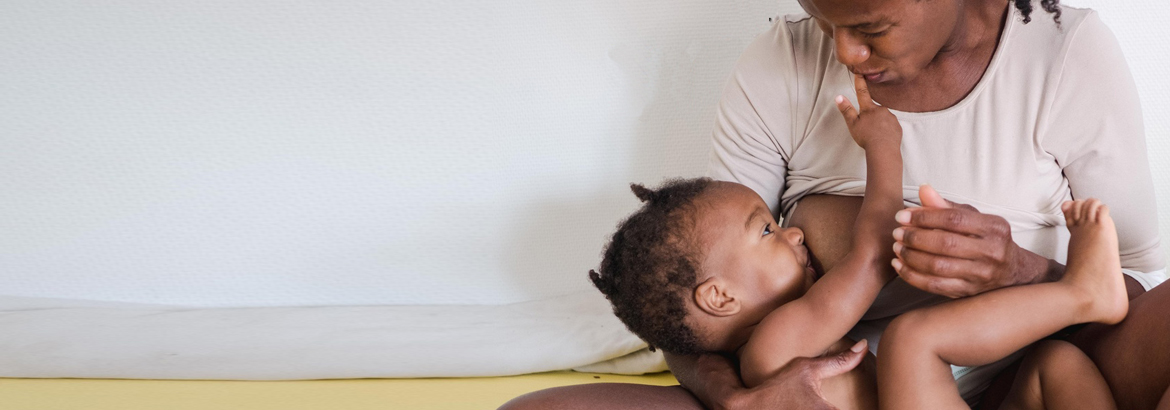
Feeding the future
Online March - May, 2021
Feeding the future, our 18th online breastfeeding conference in English, covered a wide range of topics to inform and guide your clinical practice and to inspire and challenge your thinking about breastfeeding, nutrition and human lactation.
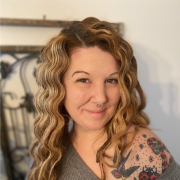
Google breastfeeding: utilizing the humanistic learning theory and relationship-based care theory as a foundation for lactation support of the millennial mother
Molly Carrigg, RNC-MNN, IBCLC - Read moreGoogle breastfeeding: utilizing the humanistic learning theory and relationship-based care theory as a foundation for lactation support of the millennial mother
Molly Carrigg, RNC-MNN, IBCLC
Molly Carrigg is a certified registered nurse and practicing IBCLC with professional experience in both OB and maternal newborn nursing. Molly is passionate about educating both fellow RNs and new mothers about breastfeeding following IBCLC standards while meeting the unique needs of the millennial mother. Molly lives in Cleveland Ohio and is pursuing her MSN in Midwifery at Frontier Nursing University.
Google breastfeeding: utilizing the humanistic learning theory and relationship-based care theory as a foundation for lactation support of the millennial mother
This presentation explored the unique characteristics and effective educational methods for the millennial breastfeeding mother. Molly explored how the humanistic learning theory and relationship-based care theory are effective approaches to early breastfeeding support and success. It also addressed the millennial lactation consultants’ obstacles and opportunities as newer members of the profession.
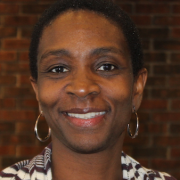
Looking backwards to move forward: African American mothers and grandmothers intergenerational breastfeeding journeys
Mary Muse, MPH, CHES, IBCLC, RLC - Read moreLooking backwards to move forward: African American mothers and grandmothers intergenerational breastfeeding journeys
Mary Muse, MPH, CHES, IBCLC, RLC
Mary Muse, a public health researcher and International Board-Certified Lactation Consultant (IBCLC), serves as the proprietor of Every Family Breastfeeding, LLC. Mary obtained her Masters’ degree in Public Health from Emory University’s Rollins School of Public Health in Atlanta, Georgia, USA. Her scholarly, practice-related, and community-based work examines the intersection of race, gender, and social class in health care and the impact on African American women’s and children’s overall health. She recently directed a research project that investigated successful and intergenerational breastfeeding among African American mothers and grandmothers and serves as the lead author of a research-based article that emanated from the study. Mary has partnered with agencies, faith-based organizations, families, and community-based organizations in Atlanta, Georgia, and St. Louis, Missouri to develop strategies that build upon strengths to improve groups’ health and educational outcomes.
Mary serves on the steering committee of the Black Breastfeeding Caucus of the Black Mothers’ Breastfeeding Association and provides pro bono lactation consultant services with an African American community-based breastfeeding support group, I AM Breastfeeding, in Ferguson, Missouri, USA.
Mary has been helping mothers breastfeed since 2005, first volunteering as a La Leche League Leader before becoming an IBCLC. She enjoys supporting mothers on their breastfeeding journeys and running her private practice, Every Family Breastfeeding, LLC.
Looking backwards to move forward: African American mothers and grandmothers intergenerational breastfeeding journeys
The United States Surgeon General’s Call to Action to Support Breastfeeding urged researchers to begin to investigate how grandmothers influence their daughters’ decision to breastfeed. Historically, grandmothers within US African American families have played a vital role in the transmission of culture. Understanding African American grandmothers’ roles today, particularly as these roles relate to infant feeding and scholarship about breastfeeding, is critical given African American women’s breastfeeding patterns. This session provides key findings from anexploratory intergenerational study that investigated African American mothers and grandmothers’ breastfeeding journeys.

The pattern of breastfeeding frequency, psychological stress and nutritional status to increase breastmilk volume and serum prolactin levels
Giyawati Yulilania Okinarum, MKeb (MMid) - Read moreThe pattern of breastfeeding frequency, psychological stress and nutritional status to increase breastmilk volume and serum prolactin levels
Giyawati Yulilania Okinarum, MKeb (MMid)
Giyawati Yulilania Okinarum is Lecturer of Midwifery and Researcher in the Department of Midwifery Profession Education at Respati University of Yogyakarta. With a background in Midwifery science, she gained her MKeb (equal to MMid) in 2017, exploring the importance of nutrition for children. Since then her research has continued to examine influences on breastfeeding to prevent stunted child, consequences of psychological stress in lactating mothers, figure out the local food in to increase breast milk, up to mentality health for nursing mothers. She is an award-winning Indonesian researcher, the founder of “Ruang Sehati” community to create the health generation, and also a member of Gender Equity Hub of Women in Global Health (WGH)-United States.
The pattern of breastfeeding frequency, psychological stress and nutritional status to increase breastmilk volume and serum prolactin levels
Failure of exclusive breastfeeding contributes to infant mortality and morbidity. Lack of milk supply causes the failure of exclusive breastfeeding. Some factors that influence milk supply are the frequency of breastfeeding, nutritional status, and psychological stress. These three things determine the quality of breastfeeding. High numbers of primipara or new mothers in Indonesian culture are experiencing physical and psychic difficulties with breastfeeding. This topic explored the patterns of breastfeeding to improve milk supply.
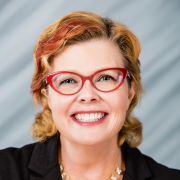
Burnout, compassion fatigue and moral injury in members of the perinatal health team
Kathleen Kendall-Tackett, PhD, IBCLC, FAPA - Read moreBurnout, compassion fatigue and moral injury in members of the perinatal health team
Kathleen Kendall-Tackett, PhD, IBCLC, FAPA
Dr Kathy Kendall-Tackett is a health psychologist and International Board Certified Lactation Consultant, and the Owner and Editor-in-Chief of Praeclarus Press, a small press specializing in women’s health. Dr Kendall-Tackett is Editor-in-Chief of two peer-reviewed journals: Clinical Lactation and Psychological Trauma. She is Fellow of the American Psychological Association in Health and Trauma Psychology, Past President of the APA Division of Trauma Psychology, and a member of the APA’s Publications and Communications Board. Dr Kendall-Tackett specializes in women’s-health research including breastfeeding, depression, trauma, and health psychology, and has won many awards for her work including the 2017 President’s Award for Outstanding Service to the Field of Trauma Psychology from the American Psychological Association’s Division of Trauma Psychology. Dr Kendall-Tackett has authored more than 460 articles or chapters and is author or editor of 38 books.
Burnout, compassion fatigue and moral injury in members of the perinatal health team
Working in perinatal care can be deeply rewarding. It can also lead to job-related burnout, secondary traumatic stress, and moral injury. Secondary traumatic stress (compassion fatigue), or moral injury, can occur when witnessing traumatic events in the workplace. This can occur when witnessing infant death or traumatic births, or when there is too much work, or work that doesn’t seem to make a difference, and little institutional support. Unfortunately, this is remarkably common among caregivers for perinatal women. Burnout, compassion fatigue, and moral injury can lead to physical and mental health sequelae for care providers and have a negative effect on the care they provider. Self-care is essential for being able to provide care to others. In this presentation, participants learnt about the causes and consequences of burnout, compassion fatigue, and moral injury. Fortunately, there is hope for recovery. Participants learnt some specific strategies for integrating self-care into their care for others.

Baby led weaning: what the lactation professional should know
Meghan McMillin, MS, RD, CSP, LDN, IBCLC - Read moreBaby led weaning: what the lactation professional should know
Meghan McMillin, MS, RD, CSP, LDN, IBCLC
Meghan McMillin holds a Master’s Degree in Human Nutrition from the University of Illinois at Chicago. She has been a Registered Dietitian Nutritionist (RDN) for 8 years and an International Board Certified Lactation Consultant (IBCLC) for 2 years. With a passion for infant feeding, Meghan has received advanced training in Baby Led Weaning and is a member of the Baby Led Weaning Network for RDs.
Located near Chicago, Illinois, Meghan is the owner of Mama & Sweet Pea Nutrition, a private nutrition and lactation practice and consulting company that specializes in prenatal, postpartum and infant care. The introduction of solids, food allergies, and baby led weaning are among her specialties.
Meghan is a member of the Academy of Nutrition and Dietetics and presented on Baby Led Weaning at their Food & Nutrition Conference in 2018, which draws over 10,000 attendees annually. She is also a member of the International Lactation Consultant Association and serves as the executive board secretary for Breastfeed, Chicago, a local non-profit.
Additionally, Meghan is a freelance writer and public speaker and enjoys sharing her knowledge through blogging and social media. She has been featured in numerous publications including Healthline, PopSugar, and the RD Lounge. Meghan is the coauthor of the eBook Avoiding Allergens While Breastfeeding; Nutrition guidance for women trying to avoid milk, soy, and/or eggs while breastfeeding.
Baby led weaning: what the lactation professional should know
Baby led weaning as an approach to introducing solids has been growing in popularity over the past 15 years. However, despite the growing demand from parents, there remains a lack of guidance from health care professionals. Additionally, there are some misconceptions around baby led weaning including safety. This presentation looked to provide further understanding of what baby led weaning is and how the lactation professional can provide guidance to parents.
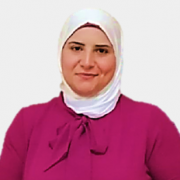
Breastmilk storage and handling in home setting
Fayrouz Essawy, MD, IBCLC - Read moreBreastmilk storage and handling in home setting
Fayrouz Essawy, MD, IBCLC
Dr Fayrouz Essawy is a neonatology consultant. She obtained her Bachelor of Medicine and Surgery from Cairo university, Egypt in 2004 and her Masters degree of Pediatrics from Ain shams University in 2012. She gained Egyptian neonatology fellowship in 2015, and also became a Lactation Consultant (IBCLC) in the same year. Dr Essawy specializes in Breastfeeding Medicine and is also a Baby friendly coordinator. In 2020 she completed the Harvard Graduate of Training trainee program.
Dr Essawy is also a member of various associations including: Egyptian Society of Pediatrics, Egyptian Lactation Consultant Association (ELCA), Academy of Breastfeeding Medicine (ABM) and the International Lactation Consultant Association (ILCA).
Breastmilk storage and handling in home setting
This presentation discussed the indications for expression in the lactation period differentiate the different types of storage containers, giving the pros and cons of each type. It also looked at human milk storage times at different temperatures for home use and for full term healthy babies. And discussed how to handle breastmilk safely, thaw and use it in different settings and situations.
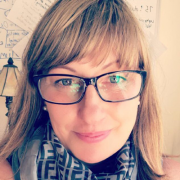
Breastfeeding aversion: current and future research
Melissa Morns, BHSc, MPH - Read moreBreastfeeding aversion: current and future research
Melissa Morns, BHSc, MPH
Melissa Morns holds a Bachelor of Health Science and a Master of Public Health Nutrition and is presently a Doctoral candidate at the Australian Centre for Public and Population Health Research (UTS) investigating the experience of those who have feelings of aversion while breastfeeding.
Melissa created online community support spaces for pregnant and tandem breastfeeding mothers and those who experience feelings of aversion while breastfeeding. Melissa is passionate about researching this phenomenon; why it happens for some who choose to breastfeed, and what health professionals can do to support this population.
Breastfeeding aversion: current and future research
Some who choose to breastfeeding can experience unexpected intense and overwhelming feelings of aversion while breastfeeding, and limited literature is available about this experience. As a result, women who experience breastfeeding aversion may not receive adequate support to achieve their personal breastfeeding goals. In this presentation Melissa shared the first review on this phenomenon, and the current research that is happening now on this topic. Melissa also shared some preliminary recommendations about what health professionals can do to support this population.
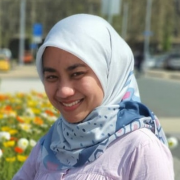
Updates on Ten Steps to Successful Breastfeeding: its cost and benefit implications
Andini Pramono, BSc, MPH, IBCLC - Read moreUpdates on Ten Steps to Successful Breastfeeding: its cost and benefit implications
Andini Pramono, BSc, MPH, IBCLC
Andini is an IBCLC currently undertaking PhD at the Australian National University. Her PhD thesis is looking at the facilitators and barriers of Baby Friendly Hospital Initiative implementation and accreditation in Indonesia and Australia. One of her PhD papers was measuring the social value of BFHI implementation and accreditation using Social Return on Investment. Her journey began when she was pregnant with her first child and was very clueless of how to feed her, then found and attended full series of Indonesian Breastfeeding Mothers Association (AIMI)’s breastfeeding classes. She then decided to volunteered as breastfeeding counsellor at AIMI. With her work experience in hospital management consulting for 8 years and personal experience when her breastfed son undertook open heart surgery, she realized that not every hospitals provide adequate education and support for breastfeeding mother, either since pregnancy, during and after birth.
Andini was awarded the Deeble Summer Research Scholarship from Deeble Institute for Health Policy Research Scholarship Program of Australian Healthcare and Hospitals Association (AHHA) in 2020 and published a Health Policy Issues Brief titled “Improving the Uptake of the Baby Friendly Health Initiative in Australian Hospitals” as the outcome. Thanks to her supervisor, Andini involved in working group for Breastfeeding Friendly Workplace Accreditation at ANU in 2018-2019 and involve in WBTi Australia since 2019. Currently living in Canberra Australia, Andini has been providing breastfeeding education and assistance for Indonesian mother-student, students’ wives or any Indonesian women who live in Canberra.
Updates on Ten Steps to Successful Breastfeeding: its cost and benefit implications
In 2018, the World Health Organization (WHO) issued the first revision of the 1989 WHO/UNICEF Ten Steps to Successful Breastfeeding. While there is evidence of the effectiveness of those Ten Steps in increasing breastfeeding rates, there has been no published analysis of the key differences between the two versions. In this presentation, Andini described the key changes in each of the Ten Steps and explore the benefits and cost implications.
She first reviewed the background to recent changes and then compare the evolution of each of the Ten Steps since 1989 and then explores the implications of new implementation guidelines in terms of the cost and benefits from different perspectives. Revisions are subtle, yet meaningful for implementation. Lessons have been learned on how the change has shifted the focus from health care staff to parents and families and shifted the responsibility for some elements of care from hospitals to the community. Exploring the costs and benefits of the Ten Steps, and who has responsibility for implementation, may increase understanding of how the Baby-Friendly Hospital Initiative (BFHI) can be implemented to make it more universal, cost-effective and sustainable.
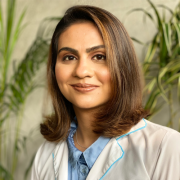
Impact of tongue ties: a collaborative approach
Ankita Shah, MDS, MFS - Read moreImpact of tongue ties: a collaborative approach
Ankita Shah, MDS, MFS
Dr Ankita Shah is a leading Airway Focused Dentist and the Director and Founder of Dentician & Tongue Tie India. She is also the President of the India Airway Co-LAB Chapter initiated by AAPMD, New York & The Breathe Institute, Los Angeles. Dr Ankita is also the only Indian Ambassador to be trained by the renowned ENT & Sleep Surgeon Dr Soroush Zaghi.
Starting off as a Pediatric Dentist, Dr Ankita was exposed to the role of oral myofascial dysfunction on maxillofacial development and malocclusion during her Fellowship in MFS Orthodontics from the OWI Institute, Barcelona, Spain. Her deep passion for learning led her to meticulously focus her research on the complex relationship and impact of tongue-ties on breastfeeding, jaw growth, airway-breathing, sleep & TMJ in both children and adults.
Dr Ankita has had the opportunity to present at various national and international platforms, such as South Asian Association of Pediatric Dentistry, Breastfeeding Promotion Network of India, Association of Lactation Professionals India, IBC Conference held by Nectar Integrated Health Services, Saudi Association of Pediatric Dentistry, Kenya Association of Pediatric Dentistry and many more.
Impact of tongue ties: a collaborative approach
What are tethered oral tissues and how can they impact breastfeeding, jaw growth, breathing, sleep, speech and neuromusculoskeletal system?
Ankyloglossia in breastfeeding infants can cause ineffective latch, inadequate milk transfer, maternal nipple pain, reflux, aerophagia and much more resulting in untimely weaning. The condition of tongue-tie and lip-tie exists on a continuum with variable visibility and symptoms. Some restrictions, mainly anterior or “classic” tongue tie, are highly visible and easier to detect. However, “posterior” or submucosal tongue-ties are often more challenging to diagnose. Feeding has proven to be significantly improved by simple safe procedures of releasing tongue-tie/lip-tie.
Airway is a hidden epidemic that is being affected by jaw shape, tethered oral tissues and habits which need attention. It takes a village of specialists to treat this challenging problem. We learnt how we can help prevent a vicious circle of problems if treated early.
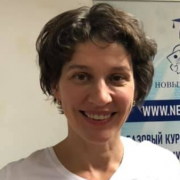
Hand expression and gentle manual techniques for stopping lactation and decreasing oversupply
Tatiana Kondrashova, IBCLC - Read moreHand expression and gentle manual techniques for stopping lactation and decreasing oversupply
Tatiana Kondrashova, IBCLC
Tatiana Kondrashova is one of the first Russian IBCLCs. She worked as IBLCE Country coordinator for Russia. Tatiana Kondrashova and Irina Ruyknova, IBCLC created the first educational program New Degree for IBLCE exam candidates in Russian language. Tatiana is the author of Mindfull latching method, which implements biomechanical science in her unique approach in teaching latching and hand expression.
Hand expression and gentle manual techniques for stopping lactation and decreasing oversupply
Historically hand expression and breast massage plays a vital role in regular lactation care in Russia. There is a long tradition of hands-on techniques that continues in the present day. All techniques are adapted to specific situations (engorgement, plugged ducts, low milk supply) . This presentation demonstrated simple techniques of breast massage and hand expression to assist parents stopping lactation and decreasing oversupply.
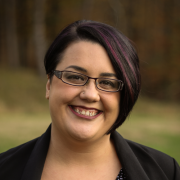
Thinking outside the box: how to incorporate trauma informed care in lactation practiceOur digital world: the ethics of breastfeeding support through social media for Millennials
Stephanie Hutchinson, MBA, BS, IBCLC - Read moreThinking outside the box: how to incorporate trauma informed care in lactation practiceOur digital world: the ethics of breastfeeding support through social media for Millennials
Stephanie Hutchinson, MBA, BS, IBCLC
Stephanie Hutchinson began her journey into lactation after the birth of her first child, Chloe. She quickly realized there were no avenues of lactation support in her area and unfortunately did not reach her goals. With her second child, Jaycee, she was determined to surpass her goals and took to educating herself. After the birth of Jaycee, Stephanie was asked to apply to become a breastfeeding peer helper at her local WIC office, the first in the county. Through her time as a breastfeeding peer supporter, Stephanie also took LEC’s Certified Lactation Specialist course and became a CLS. She went on to obtain her CLC and then IBCLC. Education wise, Stephanie has a diverse background with her undergraduate studies in Communications and Leadership, with emphasis on Maternal Child Health: Lactation Consulting. In 2016, Stephanie founded the Appalachian Breastfeeding Network, a nonprofit organization comprising of 13 states in Appalachia. It was through this venture that she sought higher learning in business. Stephanie graduated with her MBA in 2019.
Stephanie is the awardee of several awards namely Ohio Lactation Consultant Association’s Outstanding Peer Helper, Ohio Lactation Consultant Association’s Outstanding Innovation as a Cultural Change Agent, United States Lactation Consultant Association’s Terry Jo Curtis award and the United States Breastfeeding Committee’s Emerging Leader.
She currently brings a voice to Appalachia and the specific barriers to breastfeeding and access to care in rural healthcare by presenting at national and international conferences, researching with University of North Carolina, and co-authoring an Appalachian birth folklore book.
Thinking outside the box: how to incorporate trauma informed care in lactation practice
“On average, nearly 20 people per minute are physically abused by an intimate partner in the United States. During one year, this equates to more than 10 million women and men” (NCADV, 2018). Trauma happens to those who are well-to-do and to those who are homeless. It happens to parents we see every day – and many times we have no idea it is going on. Trauma, unfortunately, is embedded into many of our daily lives. Everyone seemingly experiences some form of trauma throughout their lives. Unfortunately, this is occurring at exponential rates in people of childbearing age. Therefore, lactation professionals must incorporate trauma informed care (TIC) into their practices. This 60 minute session looked in deep into what trauma informed care is, how to incorporate TIC into your practice, and an overview of trauma, birth trauma, and violent situations within a family structure as well as the medical structure. Attendees learnt how to implement TIC into their practices with a better understanding of why it is important and what triggers may be present during a consultation.
Our digital world: the ethics of breastfeeding support through social media for millennials
Today’s new parent lives and breathes technology. A generation that has grown up with new and exciting innovations enjoys having everything right at their fingertips. It is no surprise that new mothers and parents get a lot of information right from their mobile devices. At a quick glance, this is an exciting and positive change in the way we can reach and education families of new babies. However, what about HIPAA laws and privacy protection. Where do we draw the line? This session discussed what the ethics are with answering questions through social media and gave a clear definition to the attendee of how to approach an online consultation. Attendees learnt what makes Millennials and Gen Z parents tick and how to best promote and support breastfeeding along the way.
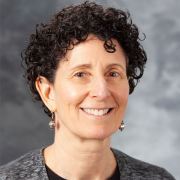
What’s new in 2020-2021Eatin’ at mom's - how the maternal diet influences breastmilk
Anne Eglash, MD, IBCLC, FABM - Read moreWhat’s new in 2020-2021Eatin’ at mom's - how the maternal diet influences breastmilk
Anne Eglash, MD, IBCLC, FABM
Dr Anne Eglash is a clinical professor with the University of Wisconsin School of Medicine and Public Health, in the Department of Family and Community medicine, USA In addition to family medicine, she has been practicing breastfeeding medicine since 1994.
Dr Eglash is a cofounder of the Academy of Breastfeeding Medicine, the Medical Director and cofounder of the Mothers’ Milk Bank of the Western Great Lakes, and the Medical Director of the University of Wisconsin Breastfeeding Medicine Clinic. She has published many peer-reviewed articles on breastfeeding medicine, has been the lead author on several Academy of Breastfeeding Medicine protocols, and has been an associate editor for Breastfeeding Medicine Journal. She co-hosts and produces a free bimonthly breastfeeding medicine podcast series, called The Breastfeeding Medicine Podcast.
Dr Eglash is founder and president of The Institute for the Advancement of Breastfeeding and Lactation Education (IABLE), a nonprofit organization dedicated to the creation of breastfeeding-knowledgeable medical systems and communities.
What’s new in 2020-2021
In this presentation we discussed a variety of clinically relevant policy statements, research findings, and systematic reviews that have been published in the last year, all of which have an impact on how we counsel breastfeeding families, and practice breastfeeding medicine.
Eatin’ at mom’s – how the maternal diet influences breastmilk
This presentation reviewed evidence for how various nutrients consumed by the lactating parent alter breastmilk, and influence the health of the nursing infant.
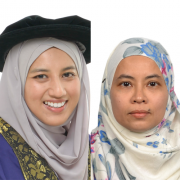
Breastfeeding and hajj: protecting the warm chain of support
Ezura Madiana Md Monoto, MBBS, IBCLC and Nor Kamariah Mohamad Alwi, IBCLC - Read moreBreastfeeding and hajj: protecting the warm chain of support
Ezura Madiana Md Monoto, MBBS,IBCLC
Dr Ezura Madiana Md Monoto is a Lecturer and a Family Medicine Specialist in the Faculty of Medicine, University Kebangsaan Malaysia. She is a mother of 4 all successfully breastfed. She has been involved in breastfeeding counseling and education since 2005 after the birth of her first child. She has been an International Board of Certified Lactation Consultant (IBCLC) since 2010. She is one of the Malaysian Breastfeeding Peer Counselor (MBfPC) Program Administrators, who is involved in the training of breastfeeding peer counselors in Malaysia under the Malaysian Breastfeeding Peer Counselor Program Association (MBfPCA). She is also the Committee Member for Universiti Kebangsaan Malaysia Medical Centre Baby-Friendly Hospital Initiative (BFHI). She has a deep interest in breastfeeding research and has been presenting her researches locally and internationally.
Nor Kamariah Mohamad Alwi, IBCLC
Nor Kamariah obtained her bachelor degree in Electrical and Electronics Engineering from Univerisiti Sains Malaysia (1998) and master degree in Information and Multimedia Technology from Universiti Tun Abdul Razak (2003). She became passionate about breastfeeding after her first born and started up a mother to mother support named SusuIbu.com in 2004. She received training in lactation management and counselling skill from Baby Friendly Initiative trainings in the local hospital. She became IBCLC in 2008 and practices in private practice. Kamariah is currently serving as ILCA board of director since 2017. She has been serving WABA as the local governance task force since 2016-2020. She was co-founder and past president of Malaysian Breastfeeding Peer Counsellor Association. She is a certified translator. She has translated many breastfeeding materials and led translation team for breastfeeding videos series in Malay by GHMP. Currently, she is pursuing master by research in USM in the field of Women’s Health.
Breastfeeding and hajj: protecting the warm chain of support
Hajj – the pilgrimage to Mecca – is the fifth pillar of Islam which every able-bodied Muslim is obligated to perform at least once in their life. Many women in reproductive age received and accepted the offers to perform hajj despite having babies who are still breastfeeding. They had little ideas on how to manage breastfeeding while performing hajj. In this presentation we described the experience of breastfeeding mother during hajj and proposed a framework of support to improve breastfeeding mothers’ experience and achieving their breastfeeding goals during and after Hajj.
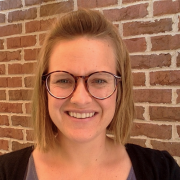
Misalignment of global COVID-19 breastfeeding and newborn care guidelines with World Health Organization recommendations
Jennifer Cashin, MPH, CLC - Read moreMisalignment of global COVID-19 breastfeeding and newborn care guidelines with World Health Organization recommendations
Jennifer Cashin, MPH, CLC
Jennifer Cashin is a public health nutritionist and certified lactation counselor with over a decade of experience supporting nutrition, food security, public health and development projects in Myanmar and Cambodia. As a Regional Technical Specialist for Alive & Thrive Southeast Asia, Jennifer focuses on strengthening the policy environment and breastfeeding-friendly health systems in Myanmar while also providing technical support to other countries in ASEAN. Her areas of expertise include research, curriculum development, and capacity building.
Misalignment of global COVID-19 breastfeeding and newborn care guidelines with World Health Organization recommendations
Babies being born during the COVID-19 pandemic are entering the world at a time of confusion and uncertainty. New questions have emerged on how to protect the health and safety of the babies and those who care for them while also still ensuring that all babies get the best possible start in life. This session presented key findings from a review of COVID-19 guidance for breastfeeding and newborn care from 33 countries, assessing alignment with WHO recommendations and the extent to which policy supported or undermined breastfeeding.

Labours of love - relactation experiences and outcomes
Lucy Ruddle, IBCLC - Read moreLabours of love - relactation experiences and outcomes
Lucy Ruddle, IBCLC
Lucy Ruddle is an International Board Certified Lactation consultant who qualified in 2018 after 4 years of providing breastfeeding support having overcome some significant challenges feeding her own babies. Lucy specialises in relactation – the process or rebuilding a milk supply without a new pregnancy. Her first book Relactation was published at the start of 2020. Lucy runs a thriving private practice on the South Coast. When not working or volunteering, Lucy can often be found on the local beach with her 2 boys, or drinking too much coffee.
Labours of love – relactation experiences and outcomes
Relactation remains a hot topic in breastfeeding support, particularly in these times of Covid 19. While many professionals and volunteers can describe the theory and technical sides of bringing back a milk supply, the true value of our work comes from compassionate, holistic care that adapts according to the family’s needs and circumstances. This talk stepped away from text books and instead focused on what real families report has been helpful, why they are drawn to relactation, and what “success” looks like to them as individuals. We took a whistle stop tour through the mechanics and then we got to know several families through case studies and explored the many ways relactation can be approached.

Neonatal hypoglycemia and hyperbilirubinemia in relation to breastfeeding
Jayant Shah, MD, DCH, IBCLC, IPPC - Read moreNeonatal hypoglycemia and hyperbilirubinemia in relation to breastfeeding
Jayant Shah, MD, DCH, IBCLC, IPPC
Dr Jayant Shah is a pediatrician and IBCLC at Nandurbar, Maharashtra, India, practicing for about 30 years. He has been a past president of BPNI-Maharashtra (Breastfeeding Promotion Network of India-Maharashtra) and a past National Secretary of the IYCF Chapter of IAP (Indian Academy of Pediatrics). He has participated as a faculty in many national conferences of IAP and contributed several articles or chapters in various publications of IAP and BPNI-Maharashtra.
Apart from Infant and Young Child Nutrition, his topics of interest are Vaccinology, Sickle Cell Disease, and Asthma. His other interests include Singing, Yoga, and Vipassana Meditation.
Neonatal hypoglycemia and hyperbilirubinemia in relation to breastfeeding
This presentation helped to understand the relationship of breastfeeding with the common neonatal issues of hypoglycemia and hyperbilirubinemia. And discussed the various reasons why neonatal hyperbilirubinemia occurs.
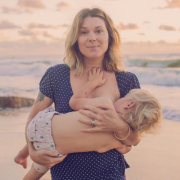
Breastfeeding beyond babyhood: how to support families
Meg Nagle, BAPSY, IBCLC - Read moreBreastfeeding beyond babyhood: how to support families
Meg Nagle, BAPSY, IBCLC
Meg Nagle is the mother of three breastfed boys and lives with her husband and children in QLD, Australia. She is an International Board Certified Lactation Consultant (IBCLC) in private practice and works with parents to help them reach their breastfeeding goals. She has a degree in psychology and her prior work was in counselling and sexual health. She was a La Leche League Leader (breastfeeding counsellor) for seven years before becoming an IBCLC. Meg is the author of books including, All Tied Up! How To Keep On Boobin’ Through A Tongue Tie and Boobin’ All Day…Boobin’ All Night. A Gentle Approach To Sleep For Breastfeeding Families. She was also filmed for a short documentary, Lactaboobiephobia, based on one of her blog posts which was released in 2016. She can be found at www.themilkmeg.com.
Breastfeeding beyond babyhood: how to support families
In some countries around the world, breastfeeding beyond babyhood is the social/cultural norm. However, in many other countries there is a large drop in the percentage of children breastfeeding beyond 12 months old. This puts breastfeeding parents in a minority group with frequent criticisms, mis-information and lack of support to breastfeed through toddlerhood and beyond. This presentation highlighted the common challenges breastfeeding families face when feeding beyond babyhood and how we can best support them through it.
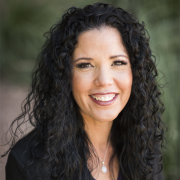
Storytelling for breastfeeding teaching
Angela Lober, PhD, RNC, IBCLC - Read moreStorytelling for breastfeeding teaching
Angela Lober, PhD, RNC, IBCLC
Dr Angela Lober is an experienced educator and clinician. She has been an IBCLC since 2005, providing evidence-based care within an academic medical center and her community. Angela is the director of the Academy of Lactation Programs at Arizona State University and the Lactation Program Manager at Banner University Medical Center – Phoenix. She is currently the president of the Arizona Breastfeeding Coalition, serves on the editorial board for the journal Clinical Lactation, and serves on the Lactation Education Accreditation and Approval Review Committee (LEAARC) board of directors. Angela completed her PhD at ASU College of Nursing and Healthcare Innovation focusing on the breastfeeding complexities of late preterm infants. She is dedicated to assisting families achieve their breastfeeding goals. Angela is also committed to education and mentorship as a means of upholding and uplifting the lactation profession.
Storytelling for breastfeeding teaching
Delivering breastfeeding education that is meaningful to the listener can be nuanced as a lactation consultant navigates through identifying a mother’s questions, beliefs, and knowledge gaps. Storytelling as a teaching method may offer a communication tool between lactation consultant and mother. The concept of storytelling for breastfeeding education was explored via an author-generated approach. Three components were identified for the practice of teaching by storytelling: asking for the mother’s story, genuinely listening to the story, then responding by storytelling. The three components can be operationalized through a seven-step process: welcoming, creating the opening, listening, considering, developing the story, telling the story, and being brave. Storytelling as a teaching modality may enhance retention of the education.
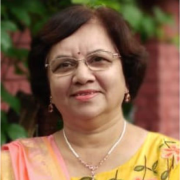
Counselling a breastfeeding mother
Sarita Bhagwat, LCEH (Mumbai), IBCLC - Read moreCounselling a breastfeeding mother
Sarita Bhagwat, LCEH (Mumbai), IBCLC
Dr Sarita Bhagwat is a Homoeopathic Physician for 33 years and an International Board Certified Lactation Consultant. She is an active member of Breastfeeding Promotion Network of India (Maharashtra), a Non- Government Organization since the year 2000. Being a Mother-Support Group Leader, she has been a past-President of the Organization. She is a Certified National Trainer for Infant & Young Child Nutrition. She is a recipient of Dr N B Kumta Award for outstanding contribution in IYCN Training & professional excellence as a Lactation Consultant.
Counselling a breastfeeding mother
Breastfeeding infants according to the WHO recommendations impacts health of women and children. Breastfeeding counselling is an effective health intervention to increase the rates of any and exclusive breastfeeding. Health workers have a key role in sustaining breastfeeding. There is an urgent need to train them in counselling skills in order to protect, promote & support breastfeeding.

Maternal mental health considerations and impacts on breastfeeding
Sayida Peprah, PsyD - Read moreMaternal mental health considerations and impacts on breastfeeding
Sayida Peprah, PsyD
Dr Sayida Peprah is both a licensed clinical psychologist and birth doula, with over 10 years of experience in both fields. She specializes in multicultural psychology, trauma, suicide prevention and maternal mental health. Dr Sayida has a multi-faceted career as a psychologist, diversity and cross-cultural educator, and community-based doula program director. Dr Sayida is also the Founder and Executive Director of the non-profit organization Diversity Uplifts, Inc, whose mission is “fostering diversity and supporting communities and the providers who serve them”.
An advocate for human rights in childbirth, Dr Sayida is a member of the Black Women Birthing Justice Collective and a Collaborator with the Black Mamas Matter Alliance, promoting research, education and community-based services to positively transform the birthing experiences of Black families. Dr Sayida has served and continues to serve on advisory committees including Perinatal Equity Initiative Committees, and formerly the California Maternal Suicide Review Committee and others aimed at identifying key risks and opportunities for quality improvement and prevention around disparities.
Maternal mental health considerations and impacts on breastfeeding
This presentation focused on increasing the sensitivity and awareness of participants regarding the impacts of maternal mental health on pregnant and postpartum individuals, with considerations to its impact on breastfeeding. Recommendations and examples for providing services, care and support to mothers with elevated risks or presentation of mental health concerns, were offered.


